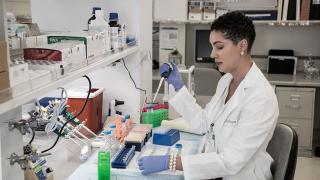For Leanne Burnham, Ph.D., a postdoctoral fellow in City of Hope's Division of Health Equities, the search for a more effective prostate cancer treatment is deeply personal. As an African American, she’s experienced the toll this disease has taken on her family and her community.
“My dad has prostate cancer,” she said. “And once he got it, it seemed like every month I’d hear of an extended family member or a friend from church getting it. And then I noticed that once one man in a family had it, many other men in the same family would get it, too.”
The facts are that African American men are the most likely to be diagnosed with advanced and incurable prostate cancer and, according to a cancer disparities report from the American Association for Cancer Research, they have a 111% higher risk of dying from it.
“If you detect prostate cancer early enough it is nearly 100% curable,” said Burnham. “The problem is that a lot of men have no symptoms, and the cancer has spread before many Black men have been tested.”
This is partly because African American men tend to get prostate cancer at an earlier age than other races, so while it’s generally recommended that men discuss screening with their physicians beginning at age 55, African Americans need to begin at 45, or even 40 if they have extensive family history.
Another problem is that the effectiveness of a treatment is often related to genetic factors — yet the patients enrolled in most clinical trials are primarily white.
“It’s not a secret that clinical trials typically do not enroll enough non-white participants,” she said. “So we are strategically accruing African American men to studies to advance precision medicine by exploring potential racial/ethnic differences in drug efficacy and outcomes due to genomic variation.”
Burnham is now a co-investigator in a City of Hope prostate cancer study designed to do exactly that.
Metastasized Prostate Cancer Risk
Metastasized prostate cancer can be treated with drugs that target receptors for the male hormone androgen. Eventually, though, the cancer cells develop clones that are resistant to hormone therapy. The cells multiply and spread, and at that point, hormone therapy is no longer effective.
The scientific terms for the responsive and nonresponsive stages of hormone treatment are castration-sensitive and castration-resistant — somewhat alarming phrases to the lay person. But they are simply anachronisms dating back decades to a far more primitive treatment for prostate cancer, one that has long since been replaced by medications.
This study will examine whether a castration-sensitive patient’s response to hormone therapy can be prolonged by a combination of the androgen suppressor abiraterone in conjunction with the poly (ADP-ribose) polymerase (PARP) inhibitor talazoparib.
PARP inhibitors have previously been given to inhibit cell growth for various types of cancer, but only for patients with a BRCA mutation. Cancers that spring from a damaged BRCA gene default to PARP as their repair mechanism of choice. Without PARP to keep up the maintenance, the cancer cells die. This is the first trial that does not have that BRCA mutation requirement — though genetics will play an important role.
This study will focus on segments of the DNA strand known as trinucleotide repeats, specifically those composed of the nucleotide combinations cytosine-adenine-guanine and guanine-guanine-cytosine, which are involved in the function of androgen receptors. Different races/ethnicities have been shown to have different lengths of these repeats — and the repeat lengths are known to have an impact on prostate cancer.
Of particular interest is the fact that African American men, who have significantly shorter repeat lengths than other races, have a strikingly higher rate of prostate cancer and mortality. In contrast, Asian men, who have the longest repeat lengths, have the lowest rates.
For this study, patients will be evenly balanced among African American, Asian and white men with metastasized prostate cancer who are still responding to hormone treatment. The hope is that by complementing abiraterone with talazoparib at this earlier stage, many lives can be prolonged.
A Wide Net for Recruitment
When Burnham first joined City of Hope under Rick Kittles, Ph.D., professor and director of the Division of Health Equities, she spoke with medical oncologist Tanya Dorff, M.D., about the problem of prostate cancer in the African American community.
Expanding the racial composition of trials was something Dorff and Kittles had wanted to tackle for a long time, and they swung into action.
“It’s incredible what can happen when you put the minds of physicians, clinical trialists and scientists together who are concerned about eliminating health disparities and improving treatment options for men who are currently incurable,” Burnham said. “When you put that diversity of skills, gender, race, ethnicity in a room together, it’s an amazing experience.”
Dorff is now principal investigator on this study, which will capitalize on City of Hope’s excellent resources for recruiting multiracial subjects. Kittles and Burnham, along with Zijie Sun, M.D., Ph.D., serve as co-investigators. In collaboration with Fornati Bedell, M.D., M.H.S., they will draw on patients from such community practice sites as Santa Clarita and Antelope Valley, where there are many African American patients, as well as from the main campus in Duarte, which has many white and Asian patients.
“Within the Division of Health Equities, we provide prostate cancer education and free screening to Black and Latino communities in the L.A. region, and we talk about the clinical trials that are offered,” Burnham. “So we’re literally recruiting from high-risk neighborhoods.”
For Burnham, finding a way to prolong these patients’ lives is a promise she made to herself when her father was first diagnosed.
“My dad is on hormone therapy,” she said, “and before he gets to the point where they don’t have any more drugs to keep him alive, I want to make sure we have something for him."

